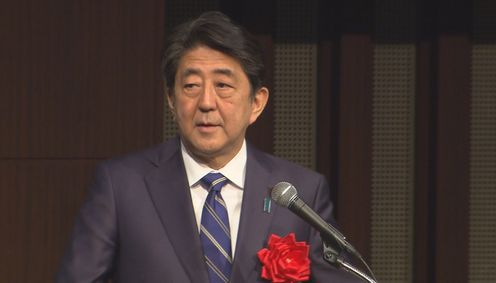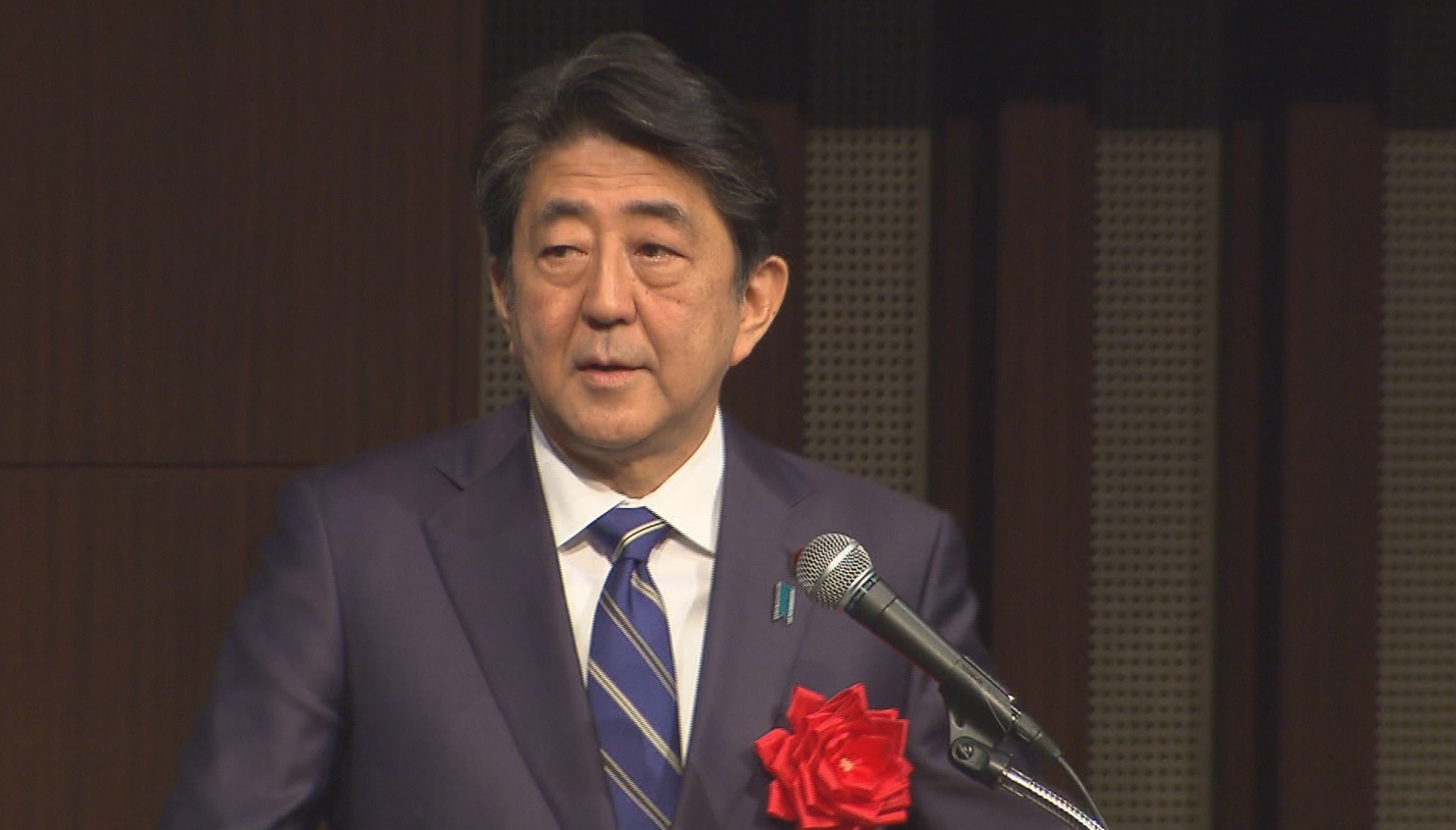Home > News > The Prime Minister in Action > March 2019 > National Meeting of Japan Agricultural Co-operatives
The Prime Minister in Action
National Meeting of Japan Agricultural Co-operatives
March 7, 2019
[Provisional Translation]
Prime Minister Shinzo Abe attended the 28th National Meeting of Japan Agricultural Co-operatives held in Tokyo.
The Prime Minister said in his address,
“It gives me great pleasure to be present at the opening of this National Meeting of Japan Agricultural Co-operatives, an event that occurs only once every three years, with the participation of so many people from across the country.
My hometown is Nagato City in Yamaguchi Prefecture, and was called Yuya-cho before it merged with the surrounding municipalities. Before that, it was known as Heki Village, and my grandfather was the mayor of that village. The agricultural, forestry and fishery industries have been the key industries of the area since then. As the areas are located in the valley between mountain ranges, it is called the Sanin (the shadows of the mountains) region. You will see many terraced rice fields spreading out there. —While I often went back to my hometown before I became prime minister, I still run around all over the area with my campaign car during my election— And these terraced rice fields continue all the way to the sea. When my campaign car came across this scene, the announcer in the car was so taken by the view that she even forgets to keep announcing my name. We call it literally a beauty that takes your breath away. It is certainly a beautiful view. At the same time, supporting those terraced rice paddies is no easy matter. They cannot be valued solely on productivity. The people of the region have dug in their heels to protect these terraced rice paddies, thus replenishing the waters of the area, protecting the environment, and preserving important culture and traditions. I believe the people live with the pride brought by that endeavor.
Japan is truly a land of rice harvest, where people have woken up early, broken a sweat laboring in the fields, shared water with each other, and prayed for an enormous harvest since ancient times. We have all worked together to preserve this beautiful agricultural landscape. We have protected our communities, the environment, and the traditions and culture of Japan. Agriculture is without a doubt the foundation of a nation. I would like to once more offer my respect to the members of JA, who secure a safe and stable food supply for the Japanese people, and make a major contribution to the promotion of agriculture.
Agriculture is the foundation of a nation. At the same time, the circumstances surrounding agriculture are extremely severe, as we see the average age of farmers exceeding 66 years old and so forth. For the very purpose of protecting agriculture, we must take on new challenges. Facing these circumstances head on, and with a strong sense of urgency that we can no longer spare time before the vitalization of agriculture, the Abe Cabinet has carried out policies to increase productivity and expand both domestic and overseas markets, such as the rice production control reviews, farmland consolidation export promotion by farmland banks, and supporting young people, who seek to work in the agricultural industry. At the same time, we established a Japanese-style direct payment system, and implemented policies to invigorate rural areas with direct payment to these mountainous regions. Furthermore, in regards to the TPP (Trans-Pacific Partnership) and Japan-European Union (EU) Economic Partnership Agreement (EPA), which have caused much concern among farmers, we have secured the removal of tariffs on all product categories targeted for export expansion, such as Japan’s globally renowned beef. We have also secured exemptions from complete tariff removal of five key categories, including rice, beef and pork as well as other measures such as tariff rate quotas and safeguards. Pressing forward assertively in areas where we should, while also protecting what must be protected. I successfully keep the promise I made at this meeting six years ago. Additionally, following the Comprehensive TPP-related policy framework, we have thus far allocated a cumulative budget of 1.3 trillion yen. We will continue to carry out policies that match with specific needs, such as expanding measures that strengthen relevant industries including the Production Power-Up Project and the Animal Husbandry Cluster Project, and those which stabilize business operations, in particular, the increase of rate of beef and pork subsidies.
Under the Abe Cabinet, the revenue of the agricultural industry has increased for three consecutive years, achieving a 900-billion-yen expansion. The number of new farmers under 40 has increased by over 20,000 people a year for four consecutive years. The exports of the agricultural, forestry and fishery industries have broken records for six consecutive years, to exceed 900 billion in 2018, bringing our export target of one trillion yen well within reach. These achievements were not made possible by the government policies alone. It is a result of continued steps of self-directed reform carried out by the JA Group, having through dialogues with farmers, reviewing conventional approaches with flexible mindsets and implementing reforms. We are now starting to see the results of these efforts. Agricultural cooperatives under the JA Group have taken the lead in developing new market channels including exports. They have also reduced the price of fertilizer and pesticide through bidding. New farmers are being raised under the agricultural policy formulated under the investment by them. I am certain that the accumulated, individual self-directed reforms carried out by each agricultural cooperative day-to-day have now borne fruit as concrete results, such as increased revenue for the agricultural industry. The Abe Cabinet will further strengthen these policies that we have expanded over these six years so as to break new ground in the agricultural industry, with determination to create a strong agricultural industry which young people will leap into with dreams and ambition, and thereby create beautiful and vibrant agricultural communities. Towards the era that follows the Heisei period, let us together build a “new era of the agriculture, forestry, and fishery industries” to which young people can entrust their futures, with the JA Group tirelessly carrying out self-directed reforms.
.
I would like to close my address with the wish that this Meeting serves to encourage the JA Group to take on new challenges, and accelerate the momentum of self-directed reform.”


